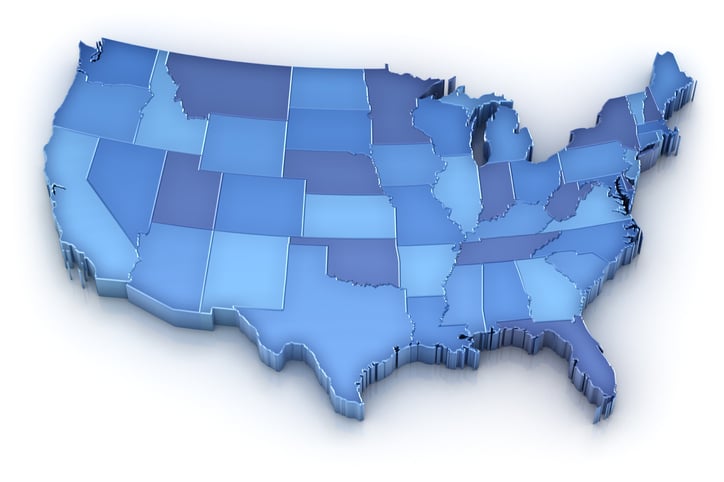Real estate investors who have net rental income from a property located in another state need to file a non-resident return and also pay tax to the state the property is located in. The rental income also must be included on the resident state tax return, as well as the federal income tax return.
Although many investors prefer not to think about taxes, it’s important to understand how taxes on out-of-state rental property work to avoid violating tax laws in another state.
Key takeaways
- Investors who own property in another state must file a non-resident state income tax return along with a resident income tax return with the state where the investor resides.
- Double taxation on rental property income is avoided with state tax credits.
- Owning a rental property in a state with no state income tax may still generate a tax liability with the investor’s home state.
Tax implications of owning property in another state
Real estate investors who own property out-of-state are required to file two state tax returns, one non-resident return for the state where the property is located and one resident tax return for the state where the investor lives.
For example, assume an investor is a resident of California and owns a rental property in Arizona.
A non-resident tax return must be filed with the State of Arizona each year to report taxable net income or loss, and the investor must also pay non-resident income tax to Arizona based on the state’s tax rate.
In addition to reporting the property’s net income to Arizona, the investor must include any out-of-state income earned on the annual state tax return filed with California, where the investor lives.
Is out-of-state income on rental property double taxed?
Back in 2015, the US Supreme Court ruled against double taxation, saying that two states can’t tax the same income.
However, a real estate investor does have to jump through some hoops by filing tax returns with two different states to report income.
Let’s take a step back and look at how state tax credits are used to avoid the double taxation of rental income from property owned in another state.
For this example we’ll assume an investor earns $250,000 per in taxable income, is married, and files a joint tax return. The investor is a resident of California, and owns a single-family rental home in Tucson, Arizona that generates $3,500 in annual taxable net income.
According to the Tax Foundation, the investor is in the 2.59% tax bracket in Arizona (based on an income of $3,500 per year) and in the 9.30% tax bracket for California (based on an income of $250,000 per year).
On the investor’s non-resident tax return filed with Arizona, an income tax of $90.65 would be paid on the net income generated by the rental property. In addition, the investor would pay tax on the rental property’s net income to California in the amount of $234.50, after receiving a credit of $90.65 for taxes paid to Arizona:
- Arizona income tax due: $3,500 x 2.59% = $90.65
- California income tax due (before tax credit): $3,500 x 9.30% = $325.50
- California income tax due (after tax credit): $325.50 - $90.65 (credit for taxes paid to Arizona) = $234.85

Steps for filing a non-resident state income tax return
Filing tax returns in multiple states may seem complicated at first, but can be simplified by following these four basic steps:
1. File a federal tax return
File a federal tax return using Form 1040, or alternate versions such as Form 1040EZ, 1040A, 1040-SR, or 1040-NR. List all rental income and expenses from the property on Schedule E, including the depreciation expense used to reduce taxable net income, along with any other sources of income.
2. File a non-resident state tax return
File a non-resident state tax return with the state the rental property is located in, being sure to only report the income and expenses from the rental property. Income earned in another state or an investor’s resident state should not be included on the non-resident state tax return.
3. File a resident state tax return
File a resident state tax return, reporting all of the income earned from the out-of-state rental property, plus any other taxable income such as income from other rental properties and W-2 or self-employment income.
4. Claim tax credit
Claim a credit on the resident state tax return for any taxes paid to another state. The state tax credit will reduce the tax liability to the investor’s resident state by the amount of tax paid to the non-resident state where the rental property is.
State individual income tax structures
According to the State Individual Income Tax Rates and Brackets for 2021 report from the Tax Foundation, there are eight states with no income tax, 10 states with a flat income tax, and 33 states (including the District of Columbia) with a graduated-rate income tax:
States with no income tax
- Alaska
- Florida
- Nevada
- South Dakota
- Tennessee
- Texas
- Washington
- Wyoming
States with a flat income tax
- Colorado
- Illinois
- Indiana
- Kentucky
- Massachusetts
- Michigan
- New Hampshire (only for interest and dividend income)
- North Carolina
- Pennsylvania
- Utah
States with a graduated-rate income tax
- Alabama
- Arizona
- Arkansas
- California
- Connecticut
- Delaware
- Georgia
- Hawaii
- Idaho
- Iowa
- Kansas
- Louisiana
- Maine
- Maryland
- Minnesota
- Mississippi
- Missouri
- Montana
- Nebraska
- New Jersey
- New Mexico
- New York
- North Dakota
- Ohio
- Oklahoma
- Oregon
- Rhode Island
- South Carolina
- Vermont
- Virginia
- West Virginia
- Wisconsin
- District of Columbia
2021 state income tax rates and brackets
The following list of the top marginal individual tax rate in each state, as compiled by the Tax Foundation:
| State | Tax rate |
| Alabama | 5.00% |
| Alaska | None |
| Arizona | 8.00% |
| Arkansas | 5.90% |
| California | 13.30% |
| Colorado | 4.55% |
| Connecticut | 6.99% |
| Deleware | 6.60% |
| District of Columbia | 8.95% |
| Florida | None |
| Georgia | 5.75% |
| Hawaii | 11.00% |
| Idaho | 6.93% |
| Illinois | 4.95% |
| Indiana | 3.23% |
| Iowa | 8.53% |
| Kansas | 5.70% |
| Kentucky | 5.00% |
| Louisiana | 6.00% |
| Maine | 7.15% |
| Maryland | 5.75% |
| Massachusetts | 5.00% |
| Michigan | 4.25% |
| Minnesota | 9.85% |
| Mississippi | 5.00% |
| Missouri | 5.40% |
| Montana | 6.90% |
| Nebraska | 6.84% |
| Nevada | None |
| New Hampshire | 5.00% |
| New Jersey | 10.75% |
| New Mexico | 5.90% |
| New York | 8.82% |
| North Carolina | 5.25% |
| North Dakota | 2.90% |
| Ohio | 4.80% |
| Oklahoma | 5.00% |
| Oregon | 9.90% |
| Pennsylvania | 3.07% |
| Rhode Island | 5.99% |
| South Carolina | 7.00% |
| South Dakota | None |
| Tennessee | None |
| Texas | None |
| Utah | 4.95% |
| Vermont | 8.75% |
| Virginia | 5.75% |
| Washington | None |
| West Virginia | 3.00% |
| Wisconsin | 7.65% |
| Wyoming | None |

How location affects rental property taxation
The amount of tax paid on rental property income is influenced by where a rental property is located and where an investor lives.
For example, an investor who is a resident of Texas pays no state income tax on net income generated from a property located within the State of Texas.
The Texas investor also does not pay tax on income from a rental property located in other states with no state income tax, such as Alaska, Florida, Nevada, South Dakota, Tennessee, Washington, and Wyoming.
But what happens if an investor based in Texas owns rental property in one of the other 43 states (including Washington D.C.) with a flat or graduated-income tax?
In situations like these, tax would be paid based on the tax rate of the state the rental property is located in, even though the investor lives in Texas where there is no state income tax.
Owning rental property in a state with no income tax does not eliminate any potential tax liability. To illustrate, assume that an investor lives in Boston where the flat state income tax rate is 5%, and owns a rental property in Florida where there is no state income tax.
Although the investor would pay no non-resident income tax to Florida, the State of Massachusetts would collect a tax of 5% from any taxable rental income the Florida property generates, because the investor is a resident of Massachusetts.
Making tax time something to look forward to
Paying taxes on out-of-state rental property can be complex, but fortunately there are tools to use that almost make tax time something to look forward to.
Stessa is a simple-yet-powerful finance tool that helps real estate investors with rental properties maximize their profits – and simplify tax reporting – for free.
Tax preparation work is minimized, tax deductions are maximized, and investors save tons of time with tax-ready reports that aggregate rental property income and expenses in mere seconds.
After creating a free Stessa account, investors can access all of the resource tools in the Stessa Tax Center for free:
- Suite of tax resources created in partnership with The Real Estate CPA, a certified public accounting firm that specializes in real estate investment
- TurboTax discount created exclusively for members of the Stessa Community
- Helpful how-to articles and blog posts detailing deduction strategies and tax preparation best practices
- Video clips that highlight how Stessa can help an investor to get organized for tax season
- Support articles and FAQ on how to use Stessa for tax preparation
Wrapping Up
Some of the potential advantages of remote real estate investing include buying rental property in markets where home prices are more affordable, the population and job market is growing, and local governments are low-tax and pro-business.
However, an investor may not be able to completely avoid paying tax on income from an out-of-state rental property, because taxes are collected based not just on where the property is located, but also where an investor resides.
While taxes on income generated from property owned in another state are a factor to consider, real estate investors also take into account the overall potential financial performance of an investment by considering key metrics such as cash on cash return and gross yield.









